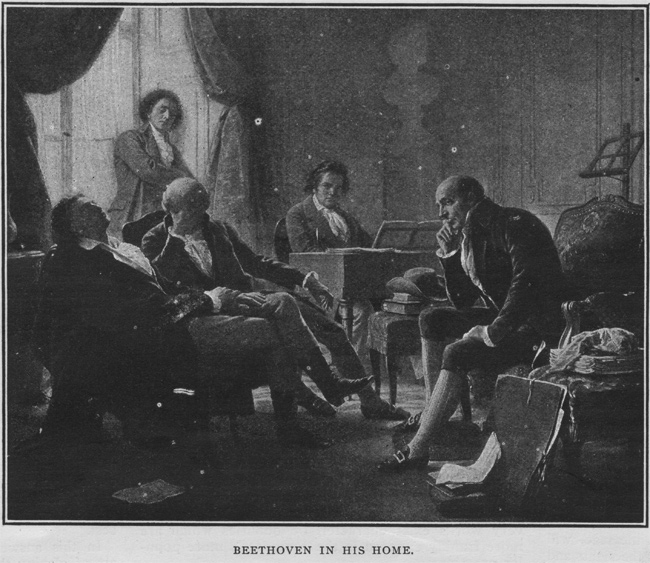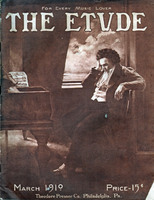KATHARINE BEMIS WILSON
The average student and lover of music, generally, receives from the start, an unfortunate impression of the character of Beethoven. He has been represented as an extremely rough, overbearing, uncultured man. Many stories are told of his eccentricities and even his studio has been pictured as an uninviting place. The floor and piano in this room are strewn with manuscripts, and we are told that Beethoven threw them there when in one of his angry moods.
Undoubtedly, Beethoven had a great deal of the “musical temperament” that we hear so much maligned in these days, but when we discover that he also had a host of friends, we are driven to the conclusion that he must have had a more lovable side.
Beethoven’s home life in Bonn was unpleasant. His father was a drunkard, and, consequently, the family suffered much from the lack of proper food and clothing. The mother was a patient, good woman, of whom Beethoven was very fond, and it grieved him because her surroundings were so disagreeable.
The first friend that Beethoven knew was his grandfather, Ludvig Beethoven, for whom he was named. This man assisted the family in every possible way until his death, in 1774, when Beethoven was four years of age. From that time on matters became worse in the Beethoven household, and a struggle for the common necessities of life began.
Johann Beethoven, the father, discovering signs of musical genius in his son, determined to develop this talent to serve his own ends. He conceived the idea of making a musical prodigy of him, and thereby obtaining the finances with which to live in ease the remainder of his life. So from Ludvig’s fourth year he not only attended the public school, but was compelled to practice upon the violin and the clavier. He knew no childhood days such as other boys enjoyed, and grew to thoroughly dislike his art. However, as his years advanced, and he grew away from the unkind management of his father, his love for his music returned. But Ludvig did owe much to his father for his opportunities for advancement.
BEETHOVEN’S FIRST TEACHER.
Johann soon realized his own deficiencies as a teacher and engaged a tenor singer, named Pfeiffer, to instruct his son. Pfeiffer was kind to the child in many ways, but was as ready as the father to sacrifice the child’s health and pleasure to a musical career. Beethoven held kindly feelings throughout his life for Pfeiffer, however, and in later years, sent him money to relieve his poverty. He is quoted as saying that he learned more from Pfeiffer than from anyone else, so to Pfeiffer, he must have owed an excellent foundation for his musical ideas.
Meanwhile, the child was taught Latin, French, and Italian, by Zambona, and received organ lessons from the court organist, Van den Eeden, an old friend of his grandfather. All these advantages were procured through the efforts of Johann, the father, who through the assistance of family and professional connections, was able to secure much help.
In 1781, Van den Eeden retired, and Christian Gottolf Neefe became court organist and Ludvig’s instructor. This was a great benefit to the boy, as he was closely associated with this man of excellent disposition and admirable musicial (sic) qualities. When Neefe was transferred to the Elector’s Palace at Munster, he appointed young Beethoven, then about eleven and a half years old, to succeed him as chapel organist, which was a position of honor. Neefe, also assisted him in the study of thorough-bass, and Beethoven began to compose.
In the year 1787, Beethoven went to Vienna, and was introduced to Mozart, with whose name the whole musical world was then ringing. Mozart was much impressed by the boy’s playing, and gave him a few lessons.
 Soon thereafter Beethoven’s mother died, and he was called home to Bonn, griefstricken, and very melancholy. He began teaching music, and exerted all his powers to keep his father’s household together. In order to do this, he was obliged to postpone his higher ambitions, and to spend many hours away from his beloved composition. But his self-sacrifice was rewarded, as he made one of the most helpful friendships of his life at this time. He became acquainted with a family in Bonn, named Van Breuning. They occupied a high social position, and were cultured, educated people. The family consisted of Madame Von Breuning, who was a widow, and her three sons and one daughter. A wonderful affection sprung up between Madame Breuning and Beethoven. She was like a mother to the youth, and he spent many happy hours in her home.
Soon thereafter Beethoven’s mother died, and he was called home to Bonn, griefstricken, and very melancholy. He began teaching music, and exerted all his powers to keep his father’s household together. In order to do this, he was obliged to postpone his higher ambitions, and to spend many hours away from his beloved composition. But his self-sacrifice was rewarded, as he made one of the most helpful friendships of his life at this time. He became acquainted with a family in Bonn, named Van Breuning. They occupied a high social position, and were cultured, educated people. The family consisted of Madame Von Breuning, who was a widow, and her three sons and one daughter. A wonderful affection sprung up between Madame Breuning and Beethoven. She was like a mother to the youth, and he spent many happy hours in her home.
In November, 1789, Johann Beethoven became so irresponsible, that part of his salary was paid over to Ludvig, to enable him to care properly for the family. Thus a very young man, Ludvig assumed responsibilities far beyond his years.
BEETHOVEN’S FIRST PATRON.
Soon after this, he met Count Waldstein, who gave him pecuniary assistance, presented him with a piano, and was his devoted friend. Fifteen years later, Beethoven dedicated to him, sonata, Op. 53, in acknowledgment of his gratitude.
Beethoven never married, but his love affairs were very numerous. At the Van Breuning home, he met many fascinating young ladies, but nearly always the object of his affection occupied a social position higher than his own. This may be the explanation of his many disappointments.
BEETHOVEN AND HAYDN.
In his twenty-second year, through the efforts of his friends, he was able to return to Vienna, and study with Haydn. The Breunings, Neefe, Count Waldstein and all of his old friends wished him godspeed, and in November, he arrived in the city of his dreams. His first lodging was a garret, but he soon moved into a room on the ground floor of a printer’s house. He became acquainted with many families in exclusive society, and enjoyed their patronage. But this was very distasteful to his proud spirit, and he was often rude when asked to play.
When he had been in Vienna about a month, news came of the death of his father. He then became the guardian of his two younger brothers, and arranged to asist (sic) them.
The instruction of Haydn was not entirely satisfactory to Beethoven and he received the additional assistance of Schenk, in the study of composition. When Haydn and Schenk left Vienna, Beethoven began studying with Albrechtsberger. He was given a good course in all forms of composition, and devoted himself industriously to his studies.
IN A NOBLEMAN’S HOME.
Prince Lichnowsky and his beautiful wife offered Beethoven a home in their palace in 1794, and he lived there for some years as one of the family. He now had ample time for composition, and moved in the best musical and social circles. An idea of his friendships can be obtained by mentioning a few of the dedications attached to his works. The dedication of the first quartets, Op. 18, was received by Prince Lobkowitz; Count Fries, the violin sonatas, Op. 23 and 24, and the string quintet, Op. 29. The Russian Count Browne and his wife; Prince Schwarzenberg; the Countess von Keglevics, and the Countess von Thun; Princess Esterhazy, and others.
In 1797 a serious illness overtook Beethoven and left his hearing impaired. He never recovered from this affliction, and it steadily grew worse. At the time of his death he was totally deaf.
In 1800 Beethoven left the hospitality of the Lichnowsky palace for lodgings in a house where he could pursue his career with greater freedom. From this time on he frequently changed his abode. He was very particular, and would find fault with some slight inconvenience and immediately make other plans.
GOETHE AND BEETHOVEN.
Goethe became one of Beethoven’s friends, and was much impressed with his musical genius, but severely criticized his rudeness and utter disregard of social customs. In 1812 Beethoven tried the baths of Bohemia, which were advised by his physician, Dr. Malfatti. Later in the year he returned to Vienna. In the course of time he quarreled with Dr. Malfatti, as he did with all of his friends.
BEETHOVEN’S MOST NOTED FRIEND.
In 1814 Anton Schindler and Beethoven became fast friends. Five years later Schindler came to live with Beethoven and acted as his secretary. Beethoven also severed this friendship by a quarrel, and they remained estranged until a short time before Beethoven’s death, when Schindler took his old position, and remained with his master until he passed away.
Beethoven’s later life was a social triumph. Kings, princes, and ambassadors when in Vienna did him honor. He was showered with money and presents, and for a time his financial position greatly improved. He became an investor in shares of the Bank of Austria. His brother Carl was allowed too free a control over the money. He and Casper, the other brother, spent a great deal of it, and were unkind to Beethoven in many ways. In 1815 Casper died, and Beethoven took Casper’s son, young Carl, into his charge. He turned out to be a scamp, and gave his uncle great anxiety.
On March 26, 1827, Beethoven died. He was reduced to poverty, and, strange to say, very few of his former aristocratic friends came to see him during his illness. After his death the whole city of Vienna seemed to awaken, and the people realized their loss, for he was deeply mourned.
In spite of his peculiar disposition and abrupt manner Beethoven had many redeeming qualities. He was generous to a fault, and was reduced to poverty because of ill-placed faith in his unworthy relatives. He was honorable, every inch a man, and possessed a wonderfully active brain. His life, from the beginning to the end, was made difficult by his family’s attitude towards him. Is it to be wondered that his friends often found him sullen and morose and his temper unreliable? His wonderful, unsullied character, combined with his musical genius, ought to overbalance his irritable disposition, brought on by trouble and the affliction of deafness.



